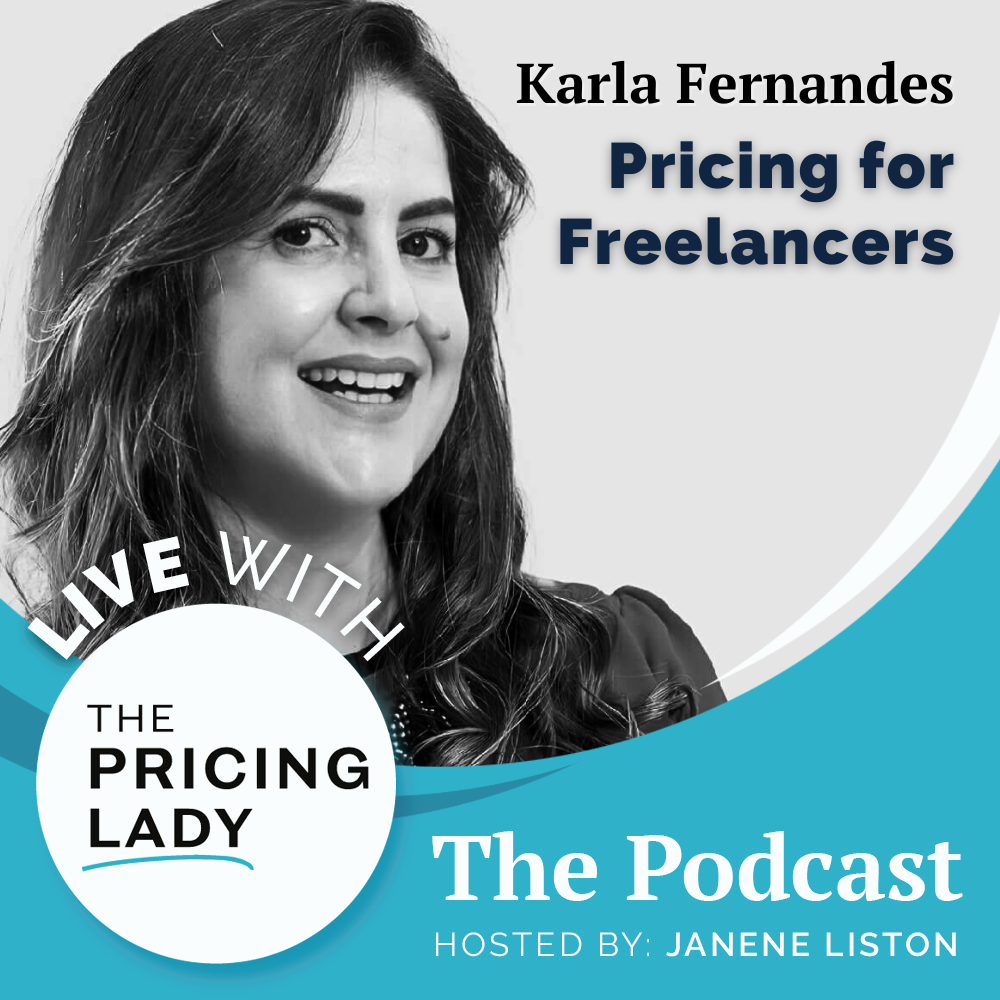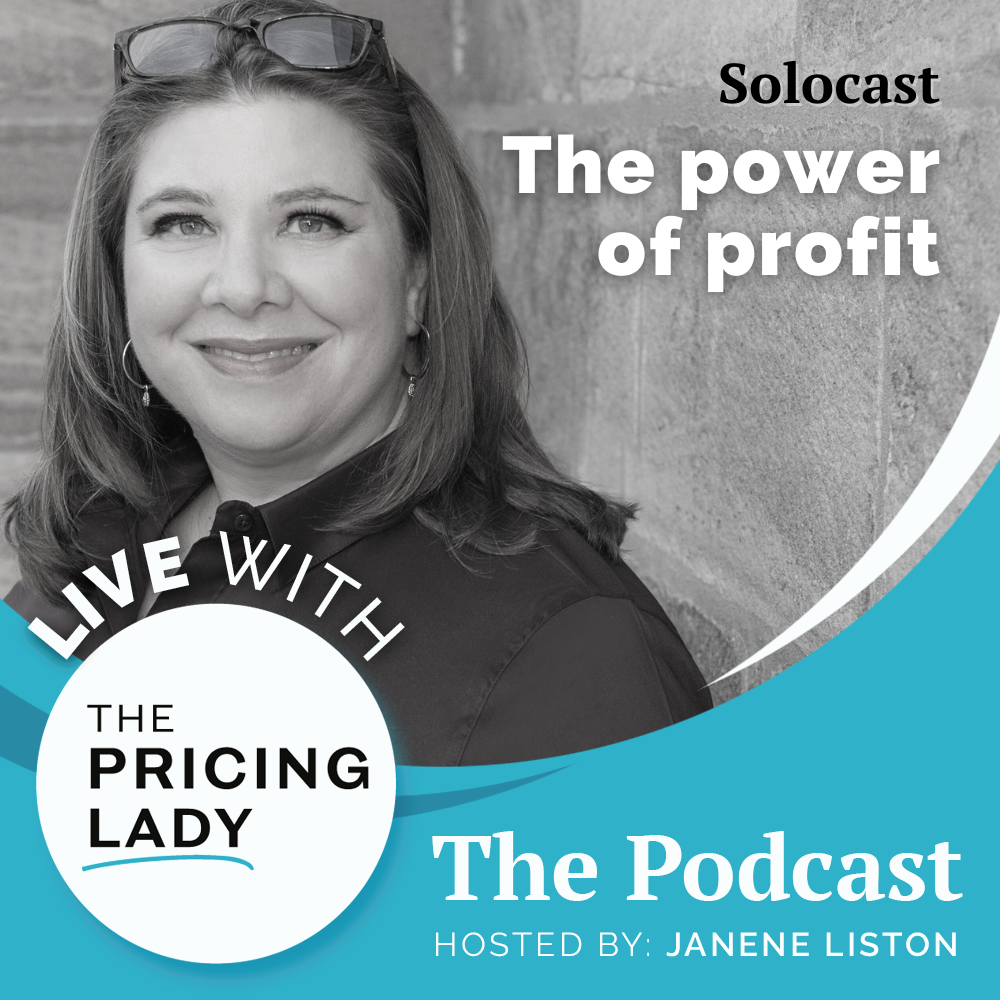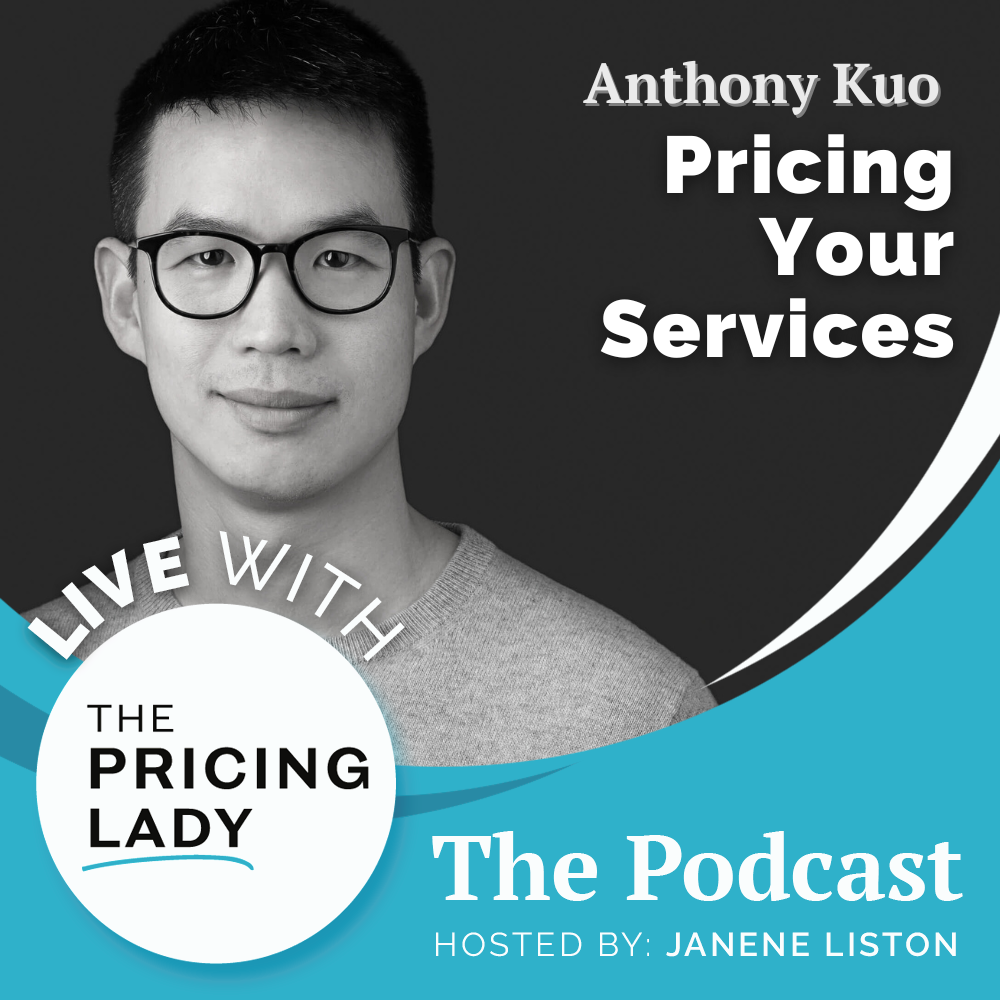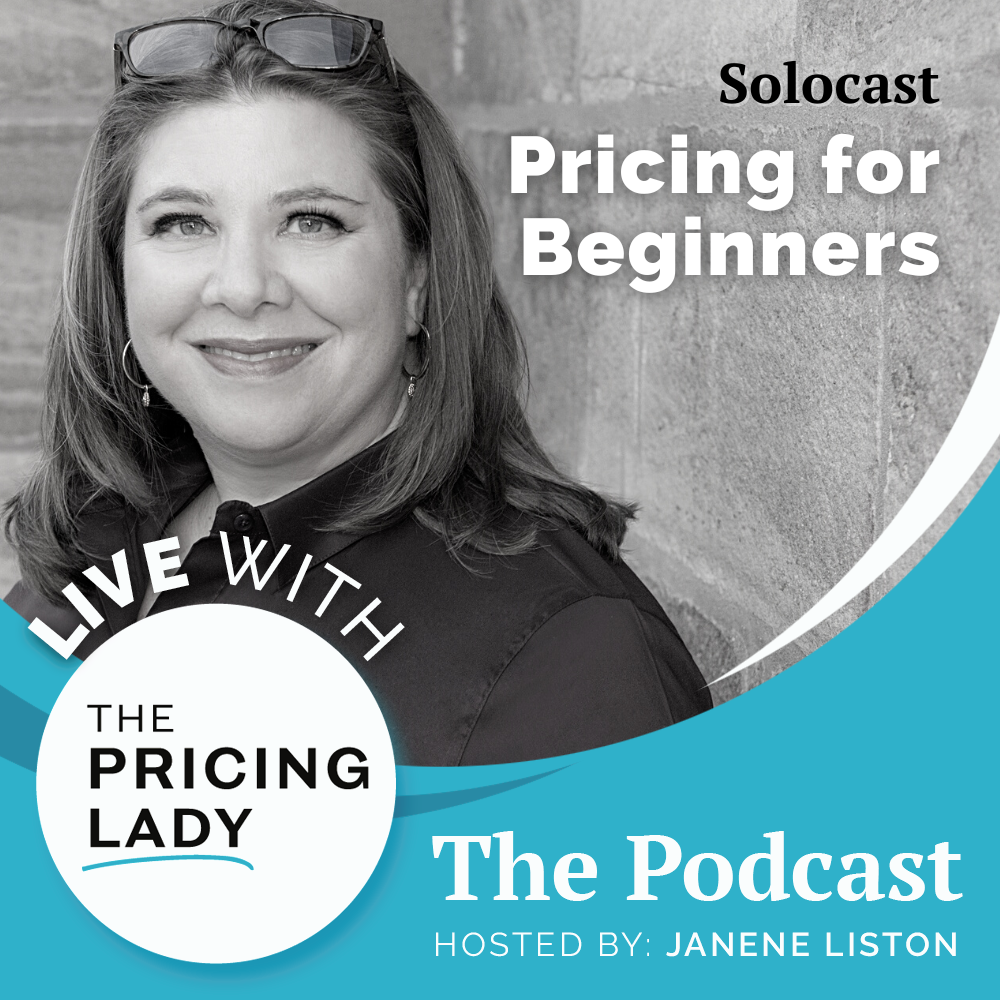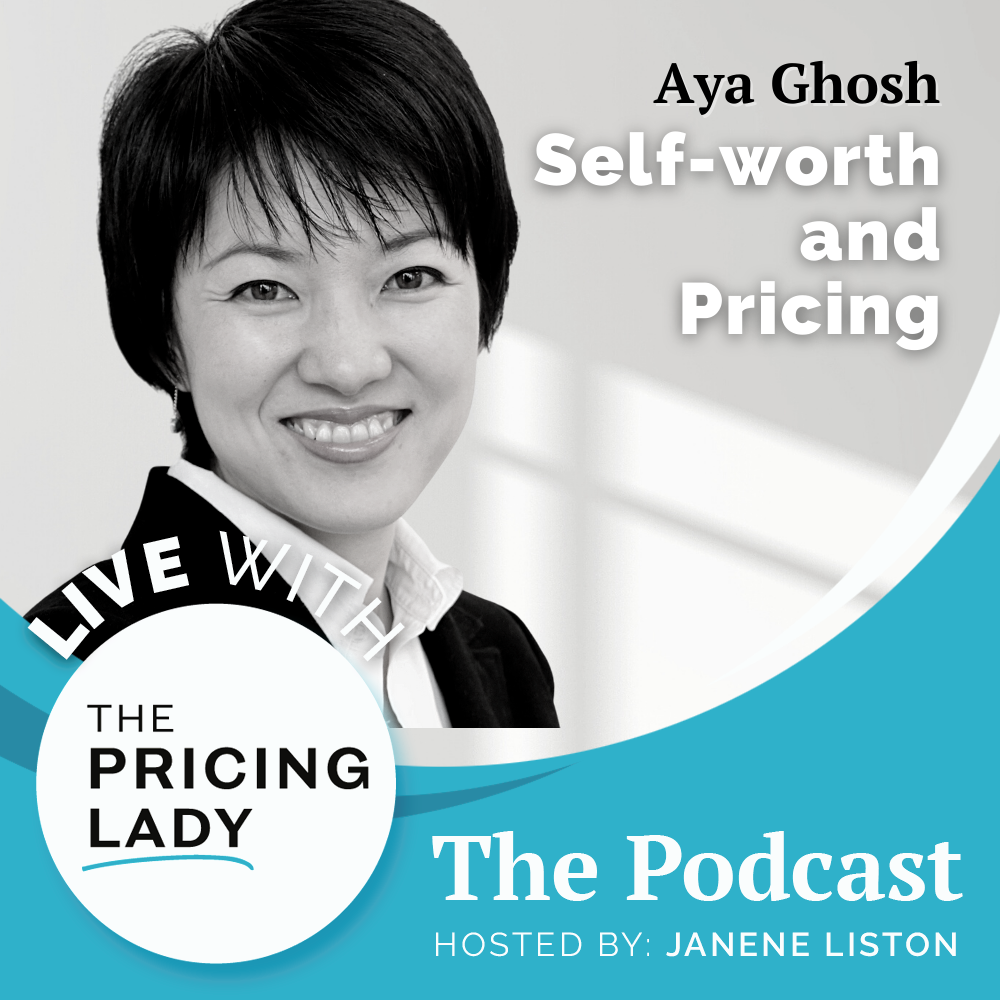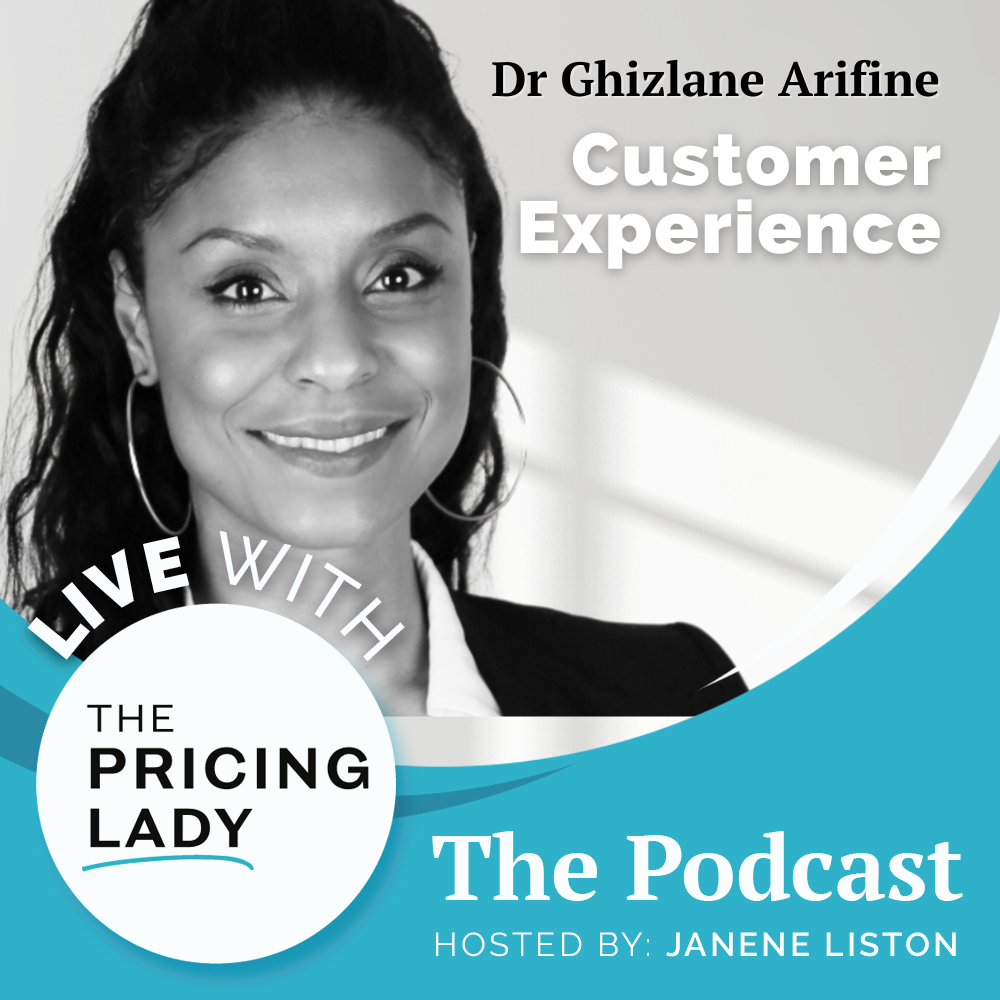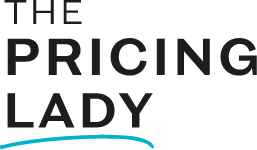“Love your pricing.
Love your work.
Love your clients.
Love yourself.
Repeat.”
The words above Rachel shared with me when we first met. It was so refreshing because very seldom will people put something like love in the same sentence as pricing. I was also fascinated to hear more of what she had to say.
Pricing can feel like a very cold and calculated topic (no pun intended). But it has its softer sides – it’s linked to things like self-love, creativity and psychology. And while what you charge should be related to the value your service, software or product delivers, there’s no denying that what you choose to charge is often driven by your own relationship with money and how you perceive yourself.
It’s worth taking a moment to consider.
In This Episode
I sat down with Rachel Madorsky, a best-selling author, speaker, psychotherapist, executive coach and self-love strategist. She guides ambitious women leaders to achieve their dreams with more wealth, pleasure and ease. Her insights and teachings have been featured on Bravo, The Learning Channel, SXSW Interactive and The CBS News. Rachel lives in Austin, Texas with her husband where they co-own an award-winning improv comedy theater, and perform together every Thursday night.
She shares her own pricing journey and how she has transformed her pricing through love. She had so many great insights to share it’s been really difficult to select quotes and words of wisdom from the episode. Her unique perspective will give you pause for reflection on your own behavior. And you can hear about her unique take on the topic and what it has done for her business.
Dare I say it — you’re going to LOVE this episode.
Podcast Episode Highlights
- 0:00 Intro
- 2:08 Getting to Know Rachel
- 4:05 The Value of Working with Rachel
- 5:20 How did Rachel start her own Business
- 9:09 Pricing at the Beginning
- 13:44 Biggest Pricing Challenge
- 21:56 Pricing Strategy
- 25:41 Best Business Advice
- 27:45 Wrapping It Up
Favorite Quotes
“My superpower is being able to tell the truth with love and give people permission to say yes to themselves.” Rachel
“Our relationship with money, our beliefs about money, our beliefs about what we’re allowed to have affect every aspect of our business, whether we’re conscious of it or not. We can be giving the most incredible value, but if we have some secret belief back there that we don’t deserve it, or if it’s fun to do, we shouldn’t make a lot of money, then we’re actually going to block our ability to receive.” Rachel
“I was so excited to charge anything in the beginning, just anything. It almost didn’t matter what the price was at the beginning. I think for a lot of us as entrepreneurs, it’s so exciting to make that move from working for someone else to working for yourself.” Rachel
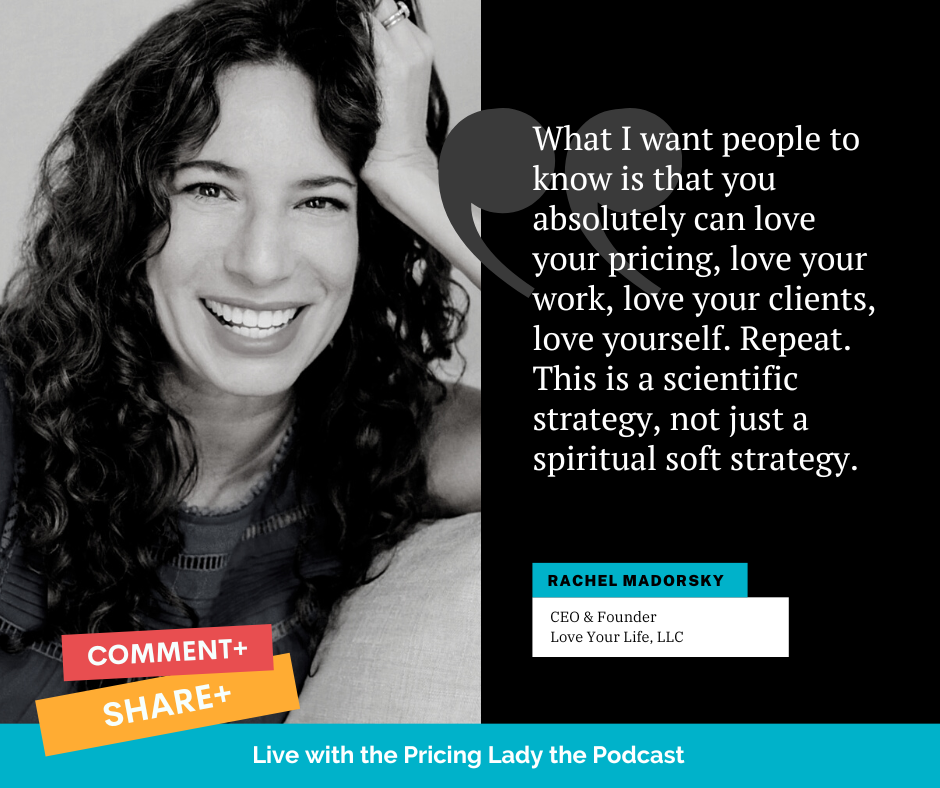
More Quotes
“We typically put a value on how much money we’re committing to something. When people say you get what you pay for, it isn’t even necessarily the service. It’s the self that we bring to the service when we commit a certain amount of money. If there’s nothing at stake, the likelihood of me showing up for myself is lower than when the stakes are higher. And that has to do with how much we charge.” Rachel
“Everything to me is like an inner game and an outer game, right? The inner piece is who would I need to be in order to deliver life-changing value in a way that’s easy and pleasurable for me and my clients.” Rachel
“Just that little bit of practice, whether it’s with the number that you’re charging or with how you introduce yourself to new people, makes a huge difference in people’s perception of you as a potential partner. To either work with or use your product or whatever it is that you are providing or delivering to them.” Janene
Episode Links
Reach out and connect with Rachel here.
LinkedIn: https://www.linkedin.com/in/rachel-madorsky-lcsw-3233374/
Facebook: https://www.facebook.com/RachelMadorskyAuthorSpeakerCoach
Instagram: https://www.instagram.com/rachelmadorsky/
Website: https://www.rachelmadorsky.com/
Grab a Copy of Rachel’s book: How to Love Yourself: In Less Than a Week & Also for the Rest of Your Life
Guide Recommendation: Should I Put My Prices On My Website
Rate, Review and Follow the Show on Apple Podcasts
“I’ve just found my Pricing Resource!” … “A binge worthy podcast.” … “I learned so much about how to improve my profitability.”
If that sounds like you, please consider rating and reviewing the pricing podcast. It helps me spread the word to more people and ultimately get more small businesses on the path to sustainable profitability and business success. Click right here, tap to rate with five stars, then select “Write a Review.” Last let me know what you loved most about the episode!
One more thing. If you don’t already, follow my pricing podcast. New episodes come out every couple of weeks, plus bonus episode. If you’re not following there’s a good chance you’ll miss something.
Reach Out, Connect and Book a Call with Janene
Linkedin | YouTube | Facebook | Email List
Get started improving your business. Sometimes it’s difficult to know where to begin. I suggest you Download the the self assessment Pricing Scorecard. Get a view of what’s working and what’s not working when it comes to pricing in your business. Figure out where to start making improvements.
Get in touch with Janene, your Business Strategist & Pricing Expert. If you’ve got a business question that needs answering, a pricing challenge you’re facing or you have suggestions for future topics or guests, let me know. Your questions and insights often become episodes. Share yours with me and let’s see where it goes. Contact Janene.
Listen up! Don’t miss out. There’s a lot going on and you’ll want to be in the know. Follow my YouTube channel (rate it too please) so you don’t miss an episode of Live with The Pricing Lady or join my Email List.
Transform your business and life. My mission is to help you build a sustainably profitable business. One where you can confidently charge for the value you deliver. Curious about my coaching and consulting offers, check them out. Let’s see how we can work together. Book a complimentary Call
Episode Transcript
Rachel, let’s start with a few rapid-fire questions. Where are you joining us from today?
Rachel: I am joining you from Austin, Texas.
Janene: Austin, Texas. I was in Austin once, I enjoyed it very much. .
Rachel: It’s a fun place.
Getting to Know Rachel
Janene: Yes. Excellent. Second question is, what is your superpower?
Rachel: My superpower is being able to tell the truth with love and give people permission to say yes to themselves.
Janene: Ooh, I like that. It’s not always easy to tell the truth, is it? Especially not with love, sometimes that can be quite the challenge. Oh, excellent. I look forward to talking more about what you do and how you work with people. But before we get to that, I’m curious, what’s one interesting thing that many people don’t know about you?
Rachel: You might be looking for something deeper, but the thing that occurs to me is that it has taken me 18 years to say yes to my husband having a dog. I was so resistant for 18 years, and now we have a dog and her name is Franny, and we’re completely in love.
Janene: Excellent. That’s so why, why did it take 18 years?
Rachel: I love animals, but I just, it just felt like a dog was just gonna be too much. I’ve always had cats. If you still have cats. I just. It’s so funny, 18 years later, now that we have Franny, I don’t even know what the problem was, , but . I mean, I must have been a control freak. I don’t know. But we have a doggy and we love her and she’s the best.
Janene: Very interesting. Well, that’s, that’s excellent. I’m sure he’s very happy as well. fine.
Rachel: Dave’s very happy.
The Value of Working with Rachel
Janene: Cool. So why don’t you tell us for a moment a little bit about what you do and what value your clients get from working with you?
Rachel: I am a psychotherapist and an executive coach, and what I do for people is help them create more wealth, peace, and ease by giving themselves everything they ever wanted in life. Now. And I specifically work with ambitious, soulful leaders.
Janene: Okay, I love that. And what value, how would you describe the value that they get from, from finding what you just described? You help them find?
Rachel: I think for all of us, myself, clients, everyone I know we’re pursuing things because we think once we get the thing, we’re going to have some other thing, right?
There’s always a there, and the value is that you don’t have to wait, like you don’t have to wait until your income changes. There’s no waiting needed. And so the value is instead of waiting forever to have the things we want, we can actually have them now.
Janene: Okay. Interesting. Ooh, I like that.
Very interesting. So why don’t we head back to the very beginning When you started your business, what led you to start your own business?
How did Rachel Start Her Own Business
Rachel: I always wanted to help people – I knew that’s something I wanted to do. Also, I wanted to be an actor, so I would flow secretly between these two things. I love improv comedy, and I love helping people, and so the improv would be on one side and the helping people would be on the other.
And I got a Master’s. I went through all the process to become a therapist and eventually, not long after I became a therapist, I was a depressed therapist, which is not a great thing to be, and I took an improv class. I fell in love, and I knew from that moment on that I wanted to have a business that brought real pleasure and joy to the people I get to serve.
Did that answer your question?
Janene: You did. I’ve never heard it put that way by anyone, but I think that’s, it’s noble sounds kind of like a silly word to use there, but it’s a very exciting motivation to have for your business. I can see that really driving everything that you do and, and how you serve your clients.
Rachel: I think another thing that I wanted to bring is, I think a lot of us are indoctrinated with this idea of if you really want to help someone, then you’re not supposed to be interested in the profit or the money. One of the paradigms I like to break for everyone I get to work with is that we can have both.
You’re allowed to love money. I like breaking away all the shame and secrecy around money. And actually connect it with being in service and pleasure, that they all actually get to go together.
Relationship with Money
Janene: Wow. This deal so much with people and I’m guessing you do as well then on this relationship with money and how it influences not just your ability to fill the coffers, but it influences everything that you do and everything that people do, especially when it comes to the pricing, it influences their behavior around pricing.
I would guess whether you have a job or you have your own business. It infiltrates everything you do.
Rachel: Our relationship with money, our beliefs about money, our beliefs about what we’re allowed to have affect every aspect of our business, whether we’re conscious of it or not.
We can be giving the most incredible value, but if we have some secret belief back there that we don’t deserve it, or if it’s fun to do, we shouldn’t make a lot of money, then we’re actually going to block our ability to receive.
Janene: I think it’s also interesting ‘cause a lot of times practitioners and therapists get some not so friendly messages from the marketplace that they should, how dare they charge for what they do? Sometimes it’s even reinforced externally, that self-belief that someone may have that they shouldn’t or earn money for what they do because they’re serving others. It gets a reinforced forced from an external source as well.
Rachel: I think even if we were to follow that back into where that comes from, we can be critical of others having something when we’re consciously or unconsciously critical of ourselves having that same thing.
Janene: Interesting. When you first stepped out into your own in your business and you had to set a price and start communicating and talking to people about what you charge, what was that like for you?
Pricing at the Beginning
Rachel: It was wild. When I really moved into private practice, I was working in a corporate setting.
I was so excited to charge anything in the beginning, just anything. It almost didn’t matter what the price was at the beginning. I think for a lot of us as entrepreneurs, it’s so exciting to make that move from working for someone else to working for yourself.
And then I remember the first time I raised my fee significantly. I just wanna say that for anyone listening, raising your fee significantly doesn’t always mean a huge dollar amount increase. Significantly can also just mean how it feels internally. And I think the biggest, most impactful raise might have been from 110 to 150
It’s so small now, but at the time, 150. Felt huge to me. And it was very empowering.
Janene: You felt empowered by it. Did it make you nervous at all?
Rachel: It did.
Janene: There’s different kinds of nervous, there’s like, so Tara Mohr in, in one of her, in her book, playing Big, she talks about two types of fear.
The one that is like, makes you wanna, grow, go and crawl into a corner and one that’s very expansive and exciting. I asked the question, but I realized maybe I should be more descriptive. If you felt nervous about it, was it a good nervousness or a bad nervousness?
Rachel: Yes. I love the way you described that. I have a similar way that I, our fees, our ideal fees stretch both the deliverer of the service and the client, and it was that very exciting kind of fear stretch.
Stretching the Client
Janene: What do you mean by stretching the client?
Rachel: We typically put a value on how much money we’re committing to something.
When people say you get what you pay for, it isn’t even necessarily the service. It’s the self that we bring to the service when we commit a certain amount of money. If there’s nothing at stake, the likelihood of me showing up for myself is lower than when the stakes are higher. And that has to do with how much we charge.
Janene: Absolutely. I’ve heard that put in, in other ways, more around the commitment that people give when they’ve, when they’ve, you know, risked a little bit more, let’s say. I’m not sure if that’s the right way to put it, but when they’ve paid a little bit more and it feels a little bit riskier than they’re a bit more committed to the process.
Yes. Is that what you mean?
Rachel: A hundred percent. And we listen in a different way. We listen, it’s so easy for me to fall into a know-it-all perspective. And if we already know then what new gets to come in, what value gets to come in. But when we pay more, we’re a little, we’re listening different.
Also, as the giver of a service as the entrepreneur. My fees are very different now, and the work I do is very different now, but for us as someone providing a service, I believe it’s ideal for that number to stretch us too. So that we show up our most excited, most alive version of ourselves. Thrilled to give whatever it is we’re gonna give, the excellence that we’re going to give.
Janene: Excellent. That was my next question.
Going Outside Comfort Zone
Janene: Because it’s important for people to understand what you mean on both sides, by stretching themselves because, I think that when you set your prices and it doesn’t feel a little bit uncomfortable for you when you’re playing it safe with your pricing, then you don’t really know what’s possible for yourself or for your clients.
Maybe I’m stretching it a bit here, but I’m gonna say it anyhow. In many ways, when you do set a price that is a stretch for both of you, it actually is going outside the comfort zone and enabling you to serve your clients better. In some ways.
Rachel: I think that’s a hundred percent true, Janene, that’s real.
Janene: Thanks for sharing that with us. Let me ask you, what was the biggest pricing challenge that you faced over the years?
Biggest Pricing Challenge
Rachel: Moving into six figure offers? And multiple six figure offers. The challenge is around not connecting how hard we worked with the value of what we bring.
I think we live in a world and hopefully this is starting to change. There’re enough people now shifting this paradigm where our value is connected to how busy we are. Our pricing should be related in some way to how difficult the task is. We have those beliefs both as consumers and deliverers of service.
What’s actually true is that it’s okay for it (our work) to be profoundly delightful and easy to give profound value at a fee that feels incredibly empowering to both, again, the client and the therapist or the coach or whoever the deliverer is of the service.
Janene: Yeah. I can see. How did you come across that being an issue for you, and what did you do differently? If somebody else were at this phase where they’re making a big leap like that, what can they do differently based on your experience?
Rachel: That’s an excellent question.
I do wanna say by leap, I didn’t go from $150 to multiple six figures. We should probably touch base about like when and how to do that. There’s a few different pieces. There’s the inner work. Everything to me is like an inner game and an outer game, right? The inner piece is who would I need to be in order to deliver life-changing value in a way that’s easy and pleasurable for me and my clients.
It’s About Our Identity
Rachel: That’s a long way to say it, but it’s about our identity. Who we’re being, how we calibrate to receive at a higher level than we’ve ever received. A lot of the work is inner work. I’ll reference a book here that I highly recommend, which is The Big Leap by Gay Hendrix.
Hopefully everyone’s read it. If you haven’t read that, make that the next book you read. To me, one of the reasons is because there’s a certain amount of good that we are all comfortable with, we’re all comfortable with our, a certain level, each of us, whether it’s a number in the bank account, a number of how happy we’re allowed to be in our relationship.
There’s a certain spot that feels normal, comfortable. As we grow past that, it starts to feel uncomfortable. We have all these questions knowingly and unknowingly; will I abandon my parents if I make more money than them? Will I not feel a part of the group that I feel I belong to?
Now all these things come up about our identity and doing this work to me is essential for raising our fees with integrity and being able to hold more money and flow more money and help our clients hold more money and flow more money. A big part is the inner work we do. Then the outer work is, I’m sure I know you have a high value on this, which is providing high value.
Making sure that what you’re giving is excellent. And then practicing.
Essence of Practicing
Rachel: One of the things that helped me was literally practicing saying these new fees that a long time ago would’ve sounded crazy. Practice, practice your new fee out loud. Even no matter what the new fee is, if there’s any discomfort, make it fun.
Practice saying it out loud and interchanging it with something very mundane. Like, could you pass the salt? My fee is $650,000 or whatever it is. Or $150 but alternate it with something simple. So that your body, even though it sounds funny, but we do, I do that, and I help my clients do that so that our body actually calibrates to that.
Janene: The practice piece is so important and it’s highly underestimated or undervalued, whichever way you wanna look at it. I think that people don’t take the time to do those little practices. often enough, especially when it comes to their pricing. It’s also like when you are at a networking event and somebody says, well, hi, I’m Janene, and Rachel, what do you do?
If you don’t practice how you want to be asked, answering that question. Then you kind of go, oh, well, yes, and kinda stumble your way through it, or you deliver something like, oh, I’m just a coach or something that isn’t like the best version of what you could be doing at the time. Just that little bit of practice, whether it’s with the number that you’re charging or with how you introduce yourself to new people, makes a huge difference in people’s perception of you as a potential partner.
To either work with or use your product or whatever it is that you are providing or delivering to them.
Continues to Evolve
Rachel: So true. I still have to practice. I’ve been doing this work for 20 years, but what I do continues to evolve and I need to find the words and say the words in a way that feels authentic and integrity and real.
Janene: Yeah. I was fine and maybe I shouldn’t confess this, but I’m gonna confess it anyhow. Oh goodness. I have one offer and it always cracks me up because for some reason I cannot remember the price of it. I always give a different price. Then the one that I’ve set. A couple of weeks ago I was like, okay, let’s just change the price.
Cuz obviously there’s something in me that is just saying, okay, it needs to be here, not here. But it was funny cuz like for the last year and a half I kept finding myself giving, you know, when I spoke it out, it came out as a price different than what I had actually put on it. It was so funny.
Rachel: I love that story, Janene. Thank you for sharing it. First of all, I love that you listen to yourself and that you’re like, well, if this is what I’m saying, let me do that, and it’s likely that it will move to the price you intended. Once this level becomes so normal and so comfortable and so integrated, and I would also recommend that to anyone who wants to raise or change their fee, set a fee that does feel good.
That’s just a little bit of a stretch that helps you come alive. You don’t have to make giant leaps.
Janene: Actually, it was the other way around in the..
Rachel: Yes. How powerful is that?
Nobody Likes to Confess This
Janene: It wasn’t a big difference, but it kept coming out wrong and then I’d be like, oh, wait, was that the right? And then I found myself, okay, well, doing what coach people not to do, which is not be confident in the message you’re delivering. I was like, okay, well if I need to be confident, I didn’t to just make it what I’m keep saying and telling people.
Rachel: that’s amazing.
Janene: So that I don’t guess, second guess myself along the way.
It’s important also, nobody likes to confess the mistakes they make. It’s never pleasant, but it’s important also for people to understand that, just because I’m a specialist in this area or you’re a specialist in your area, doesn’t mean that we don’t have to work at it sometimes, and that we also don’t make those mistakes along the way.
Rachel: A hundred percent. Except I would say from my perspective, I don’t see that as a mistake. I see that as like a learning, divine intervention that you’re accidentally saying a higher fee because that is the true energetic match for the service you’re providing.
Janene: It’s so funny. One more question before we start wrapping this up. What’s one thing or one pricing tactic or strategy that you think has served you well over the years?
Pricing Strategy
Rachel: I’m gonna share one that I think is really out of the box that I don’t think a lot of people are told, and it has really served me when I’m looking at my life.
And that is to first create the structure, the schedule. That is my ideal schedule, exactly when I wanna be working, how I wanna be working, what hours those are. Then also take the time to set a money goal. What, what is the amount I would love to make? Then put those things together.
How much time do I wanna give, how much do I wanna work, how much do I wanna make? And discover my pricing from there. Because my time is valuable. Your time is valuable. Find the number from that place and then make good on it by delivering something incredible that surpasses even that amount.
Janene: It’s great that you bring that up. I have a toolkit on my website and one of the tools, actually does just that. You put in some things about the number of days and hours and things like that. You’re gonna be working and then your hourly rate and you can see very quickly what’s possible.
Then adjust from there. I’ll put that in the show notes for everyone if they wanna take Rachel’s advice and have a little tool to help them along the way.
Rachel: I wanna say something about that, Janene, that first of all, that’s so brilliant that you have it and so generous that you’re able to give that.
I also wanna speak to, I don’t actually consider that I’m trading my time for dollars, and I think a lot of entrepreneurs, we don’t wanna do that. This is more for yourself to know.
Our Work Grows Us in Every Way
Rachel: What your time is worth to you. It’s still not exactly, you’re not trading time for dollars. You still wanna charge for the result and the value that’s received.
Janene: Absolutely. I totally a hundred percent agree with that one. I would say time is just the wrapper your services are delivered in. Cool. Thank you very much. I’m gonna start wrapping this up. What’s one thing that you would like people to take away from our discussion today?
Rachel: That self-love. We didn’t really get into it that much. One of the things I am as a self-love strategist, which I know might sound kind of fufu, but what I want people to know is that you absolutely can love your pricing, love your work, love your clients, love yourself. Repeat. This is a scientific strategy, not just a spiritual soft strategy.
Janene: Thank you for sharing that. I love that sequence of phrases there. I don’t remember them, but I will make sure that they are on a quote or something because they’re. it’s so true that so much of what you do, you know, let me put it this way. When I started my own business, I’m sure people told me upfront, but it never resonated with me.
Having your own business is a personal development journey, not a career development journey. I never really understood that when I got into it. But I’ve learned that definitely along the way. And I think part of that is, you know, the loving yourself is sort. You know, what is, is what you need to lead with in a sense.
Rachel: I love that you’re saying that, Janene. It’s so true. Our work grows us in every way.
Best Business Advice
Janene: Absolutely. What is the best business advice you’ve ever been given?
Rachel: Allow everything, accommodate very little.
Janene: Interesting. I like that. I think those are some words to live by for sure.
Rachel: There’s a lot we could say about it, but one, there’s so many ways where we take things personal. If we can step back and allow everyone to have their full experience, their opinions, their thoughts, their feelings make space for all of it and accommodate very little meaning. Be a stand for what you value and what’s important to you and your time and your wishes and your desires and your dreams.
Janene: Very important things to live by. I know that you have a book out coming out. Why don’t you tell us a little bit about that.
Rachel: Thanks for asking. I wrote a book I wanted. It’s called How to Love Yourself in Less Than a Week and also for the Rest of Your Life.
I wrote this book because I discovered as an entrepreneur that self-love really is a massive thread that increases our capacity to give and our capacity to receive. And I wanted it to be fun, light, and easy. Also, I wanted there to be a tangible way to love yourself. I was told many years ago, this thing will resolve itself if you would love yourself. And I remember thinking, at the same time got the secret to the universe with no instructions.
You hear that all the time, but what does it mean? I wrote a book about it. It was a number one bestseller on Amazon and it’s about to come out in hardback. It’s out now. I hope you’ll gift gifted to yourself. There’s actual business tips in there as well.
Wrapping It Up
Janene: Excellent. We’ll be sure to put the link to that in the show notes. And Rachel, one last question, where can people reach out and find you?
Rachel: People can find me at my website which is rachelmadorsky.com. There are free resources there. There are all sorts of stuff there. And I would love to connect and support.
Janene: We’ll put the link to her website and other links to social media in the show notes as well. For everyone, thank you so much for being here with me today, Rachel. I’ve really enjoyed our conversation. It’s given me so much to think about.
Rachel: Thank you, Janene. Thanks for being so open and be with us as we talk about this.
Thank you really for having me. Appreciate it.

